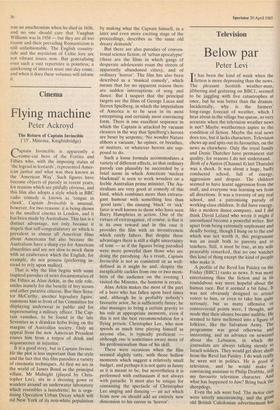Cinema
Flying machine
Peter Ackroyd
The Return of Captain Invincible ('15', Minema, Knightsbridge)
Captain Invincible is apparently a comic-cut hero of the Forties and Fifties who, with the imposing status of 'the legend in leotards', represented Amer- ican justice and what was then known as the 'American Way'. Such figures have become objects of parody in recent years, for reasons which are pitifully obvious, and this film also adopts a style which in BBC radio comedy is known as 'tongue in cheek'. Captain Invincible is unusual, however, for two reasons: it is being shown in the smallest cinema in London, and it has been made by Australians. This last is a distinct advantage, not only because it dispels that self-congratulatory air which is prevalent in almost all American films about Americana but also because the Australians have a sharp eye for American absurdities and are not slow to mock them with an exuberance which the English, for example, do not possess (preferring in- stead to rely upon malice).
That is why the film begins with some inspired parodies of news documentaries of the Fifties as Alan Arkin, in the title role, Riffles inanely for the benefit of boy scouts and other putative citizens. But then Sena- tor McCarthy, another legendary figure, summons him in front of his Committee for displaying underwear in public and for impersonating a military officer. The Cap- tain vanishes, to be found in the late Seventies as a drunken hobo living on the margins of Australian society. Only an appeal from the new American President rouses him from a torpor of drink and acquiescence in injustice.
It is a good story, but in Captain Invinci- ble the plot is less important than the style and the fact that this film parodies a variety of cinematic techniques. At first we are in the world of James Bond as the principal villain, Mr Midnight (played by Chris- topher Lee), sits in a dressing gown or wanders around an underwater laboratory which resembles a laundrette; he is orga- nising Operation Urban Decay which will rid New York of its non-white population by making what the Captain himself, in a later and even more exciting stage of the proceedings, describes as 'the same old dreary demands'.
But there are also parodies of conven- tional science fiction, of 'urban apocalypse' (these are the films in which gangs of desperate adolescents roam the streets of apparently abandoned cities), and of ordinary 'horror'. The film has also been described as a 'musical comedy', which means that for no apparent reason there are sudden interruptions of song and dance. But I suspect that the principal targets are the films of George Lucas and Steven Spielberg, in which the imperialism of America is to be seen in its most enterprising and certainly most convincing form. There is one excellent sequence in which the Captain is attacked by vacuum cleaners in the way that Spielberg's heroes are beset by serpents; 'No wonder Nature abhors a vacuum,' he opines, or breathes, or mutters, or whatever heroes are sup- posed to do.
Such a loose formula accommodates a variety of different effects, so that ordinary parody can plausibly be succeeded by a brief scene in which American 'nuclear blackmail' is seen to work wonders on a feeble Australian prime minister. The Au- stralians are very good at comedy of this kind, which combines more than extrava- gant humour with something less than 'good taste'; the ensuing 'black' or 'sick' farce is well known to those who have seen Barry Humphries in action. One of the virtues of extravagance, of course, is that it is its own reward and in this case it provides the film with an inventiveness which rarely falters. But despite these advantages there is still a slight uncertainty of tone — as if the figures being parodied were more powerful than those who are doing the parodying. As a result, Captain Invincible is not as consistent or as well- defined as it might be and, despite the inexplicable cackles from one or two mem- bers of the audience on the evening I visited the Minema, the humour is erratic.
Alan Arkin makes the most of the part of a hero who has fallen upon hard times and, although he is probably nobody's favourite actor, he is sufficiently funny; he also manages to bring a certain gravity to his role at appropriate moments, even if this is not the best recommendation for a flying person. Christopher Lee, who now spends as much time playing himself as anyone else, is typically proficient although one is sometimes aware more of his professionalism than of his skill.
There were occasions when the film seemed slightly tatty, with those hollow moments which suggest a relatively small budget, and perhaps it is not quite as funny as it is meant to be, but nevertheless it is performed with enthusiasm if not always with panache. It must also be unique for containing the spectacle of Christopher Lee singing and dancing — an act which from now on should add an entirely new dimension to his career in 'horror'.














































 Previous page
Previous page